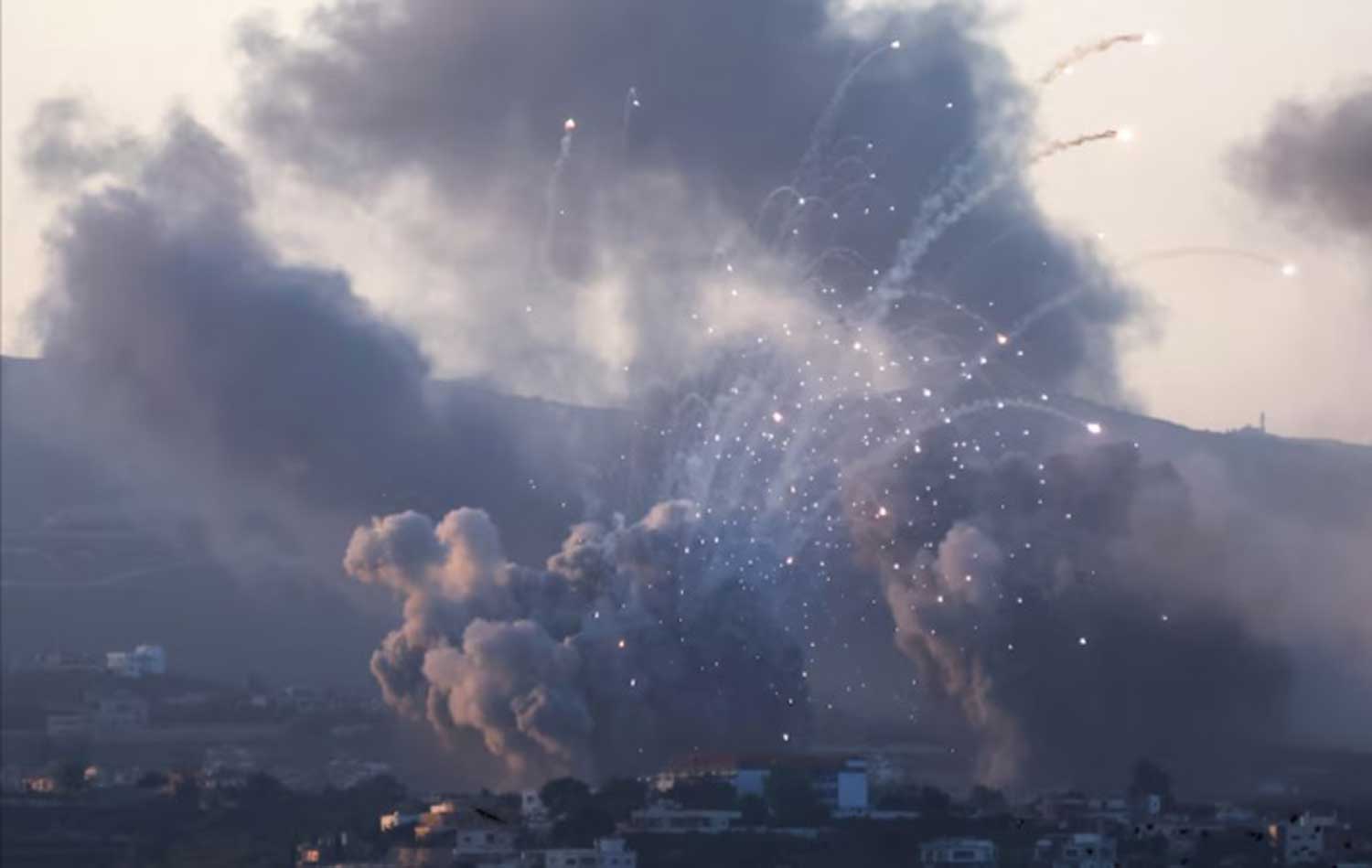Israel announced that it conducted airstrikes targeting hundreds of Hezbollah positions on Monday, resulting in the deaths of at least 274 individuals, marking the deadliest day in Lebanon in decades, according to Lebanese officials. This escalation intensifies nearly a year of ongoing conflict with its Iran-backed adversary. Following significant cross-border exchanges of fire, Israel urged residents in Lebanon to evacuate areas identified as sites for weapon storage by the militant group.
After nearly a year of conflict with Hamas along its southern border, Israel is now redirecting its attention to the northern front, where Hezbollah has been launching rockets into Israeli territory in solidarity with Hamas. On Monday, Israel’s military executed extensive strikes against Hezbollah in southern Lebanon, the eastern Bekaa Valley, and northern regions near Syria. Lebanon’s health minister reported that the airstrikes resulted in 274 fatalities, including 21 children and 39 women, with 1,024 individuals injured, marking the highest death toll since the conclusion of the civil war from 1975 to 1990.
Prime Minister Benjamin Netanyahu stated that Israel is experiencing “complicated days” as it intensifies its military operations in southern Lebanon, urging Israelis to maintain unity during this ongoing campaign.
“I committed to altering the security dynamics and the power equilibrium in the north, and that is precisely what we are executing,” he conveyed in a message following a situational briefing at military headquarters in Tel Aviv.
Earlier, Defence Minister Yoav Gallant indicated that military actions would persist until the objective of safely returning northern residents to their homes is achieved, suggesting a protracted conflict ahead, especially as Hezbollah has pledged to continue fighting until a ceasefire is established in Gaza.
The Israeli military reported that it had targeted approximately 800 sites associated with Hezbollah in southern Lebanon and the Bekaa Valley. “Among the targeted sites were structures where Hezbollah concealed rockets, missiles, launchers, UAVs, and other terrorist infrastructure,” the military stated.
Reuters has not been able to independently verify Israel’s claims regarding Hezbollah’s alleged storage of weapons in residential areas. Hezbollah has refrained from commenting on these allegations but has asserted that it does not position military assets near civilian populations.
In retaliation to the airstrikes, Hezbollah announced that it had launched numerous missiles at a military installation in northern Israel.
Warning sirens were activated in the northern region of the occupied West Bank on Monday as Hezbollah’s rocket fire spread further south from the border areas in northern Israel, which have experienced the most intense attacks in the recent conflict. Alarms were also triggered in various locations across northern Israel, including the port city of Haifa, as reported by the military.
Further assaults from Lebanon are anticipated. Israeli aircraft are reportedly preparing to target Hezbollah’s strategic weaponry concealed within residential areas in Lebanon’s Bekaa Valley, according to an Israeli military spokesperson, who urged civilians to evacuate without delay.
“The current scenes from southern Lebanon show secondary explosions of Hezbollah munitions detonating within homes. Every residence we are targeting contains weapons—rockets, missiles, and unmanned aerial vehicles intended for the purpose of harming Israeli civilians,” stated Rear Admiral Daniel Hagari in a televised address.
The strikes have intensified pressure on Hezbollah, which recently faced an unprecedented attack, as described by its Secretary General Hassan Nasrallah, following the detonation of thousands of pagers and walkie-talkies utilized by its members. This operation has been largely attributed to Israel, although the country has neither confirmed nor denied its involvement.
In a significant setback, an Israeli airstrike on Friday in Beirut’s southern suburb resulted in the deaths of 45 individuals, including senior Hezbollah commanders, according to the Lebanese health ministry. Hezbollah confirmed that 16 of its members were among the deceased, including prominent leader Ibrahim Aqil and another commander, Ahmed Wahbi.
The ongoing conflict has heightened concerns that the United States, a close ally of Israel, and Iran may become embroiled in a broader Middle Eastern war. One individual sustained minor injuries from shrapnel during a rocket barrage in northern Israel, as reported by the Israeli ambulance service.
Imad Kreidieh, the head of Lebanese telecommunications company Ogero, informed Reuters on Monday that over 80,000 automated calls urging residents to evacuate their areas were detected on the network, though not all were responded to.
Lebanon’s Interior Minister Bassam al-Mawlawi has designated schools in Beirut, Tripoli, and southern regions as shelters due to significant citizen displacement, according to his office. Evacuation alerts have been reported as far as Beirut, the capital. Information Minister Ziad Makary stated that his ministry received an evacuation order but clarified that they would not comply, describing the situation as a “psychological war” in comments to Reuters.
Amid a severe financial crisis, Lebanon is ill-prepared to endure another conflict similar to the 2006 war, which saw extensive Israeli bombardment and substantial damage to the nation’s infrastructure during its confrontation with Hezbollah.
In the Sassine district of eastern Beirut, state employee Joseph Ghafary expressed concerns that Hezbollah might retaliate against Israeli attacks, potentially leading to a full-scale war. “If Hezbollah undertakes a significant operation, Israel will respond with even greater force. We cannot withstand that,” he remarked.
Shop owner Mohammed Sibai from the Hamra neighborhood shared his perspective with Reuters, viewing the recent increase in strikes as indicative of an impending war. “If they desire war, what can we do? It has been forced upon us. We are powerless to change it,” he stated.
Discover more from Defence Talks | Defense News Hub, Military Updates, Security Insights
Subscribe to get the latest posts sent to your email.





